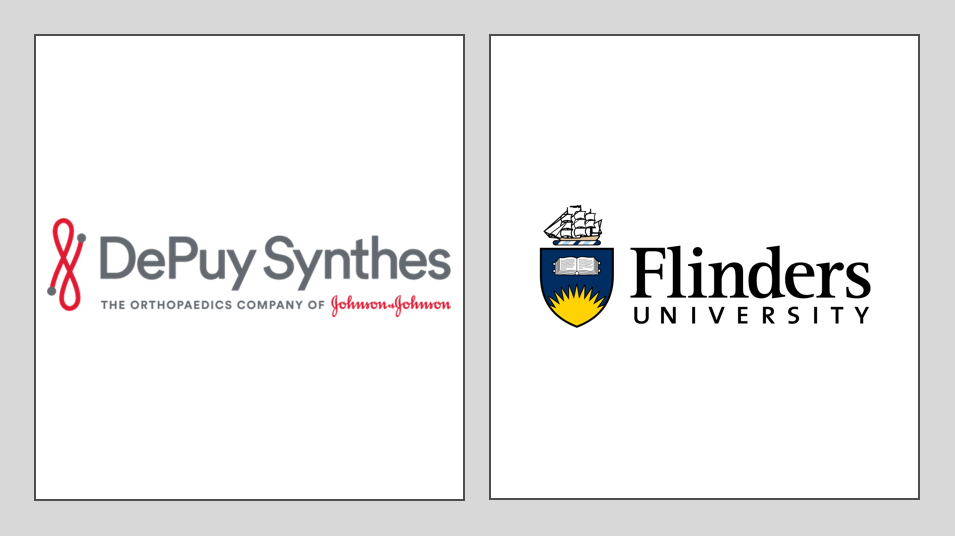News & Trends - MedTech & Diagnostics
J&J’s DePuy Synthes partners with Flinders to foster innovation in orthopaedics

MedTech News: A major new research project focusing on 3D technology for knee, hip and spinal surgery is commencing in South Australia.
Under a new $2.4 million project, led by a $1 million Australian Government AusIndustry Global Innovation Linkage Program grant, Flinders University’s Medical Device Research Institute researchers will collaborate with DePuy Synthes, the orthopaedics company of Johnson & Johnson Medical, and South Australian company Fusetec to develop surgical training models for improved knee, hip and spine surgeries.
Andrew Giles, Chief Operating Officer of DePuy Synthes Australia, said “This collaboration between industry and academia is an excellent opportunity to bring Australian medical innovation to the world stage. We’re proud to trial the innovative surgical models and play our part in refining the training approach for a range of orthopaedic procedures in a safe and controlled environment.”

Fusetec chief executive Mark Roe said the world-leading 3D technology under development at the Adelaide-based company can simulate a variety of medical training devices, reproducing exacting density of all anatomical tissues and bone densities and reproducing organs or joints to an accuracy of 20 microns among a wide range of features.
“Our collaborative outcomes in this project will have a wide range of benefits to the healthcare sector, including the ability to upskill residents and surgeons in a risk-free environment from potentially harmful bacteria. The project will also provide pathology on demand, meaning complex surgical training can now be rehearsed prior to undertaking potentially life-threatening operations,” Mr Roe added.
Strategic Professor of Biomedical Engineering Mark Taylor said Flinders University is internationally recognised for its experimental and computational work on better orthopaedic devices or orthopaedic biomechanics.
“In particular, Flinders researchers have used technology to characterise tissues and modelling of joints, which will support Fusetec to develop the next generation of anatomical models,” Professor Taylor stated.
Professor Karen Reynolds, director of the Medical Device Research Institute at Flinders, Tonsley, and Associate Professor John Costi, from the College of Science and Engineering, are also on the Flinders University research team.
Development of the new technology will be supported by advanced bio-model workshops led by DePuy Synthes, which will trial the Fusetec anatomical models as part of Johnson & Johnson’s surgeon training for use of their digital technologies.
Professor Taylor is also Flinders University lead in the Australian Research Council Training Centre for Medical Implant Technologies (ARC CMIT), which provides training for PhD students and early career researchers to engage with industry and clinical partners. The Centre specialises in personalised 3D printed orthopaedic and maxillofacial implants.
Digital & Innovation

Medical drone to reduce health equity gaps in rural and remote Australia
A specialised medical drone which increases accessibility to essential health services such as pathology, medicines, and telehealth services in rural […]
MoreNews & Trends - Pharmaceuticals

We’ve spent more on healthcare, but it’s been worth it
Healthcare expenditure is surging, with Australia now allocating approximately one-tenth of its budget to this sector. This financial uptick prompts […]
MoreNews & Trends - Pharmaceuticals

New partnership to raise the bar in precision oncology in Queensland
Pharma News: The Australian Translational Genomics Centre (ATGC) is teaming up with non-profit research organisation Omico and the PrOSPeCT program […]
MoreNews & Trends - Biotechnology

AusBiotech appoints new CEO: Former Sanofi corporate affairs and sustainability leader takes the helm
Biotech News: AusBiotech, the nation’s leading industry body for the biotech sector, has named former leader at Sanofi, Rebekah Cassidy, […]
More